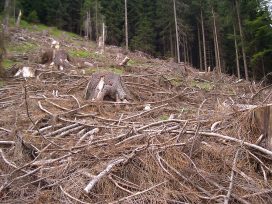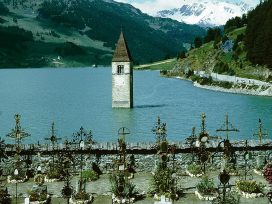Almantas Samalavicius: The concept of ecological economics differs fundamentally from that one of neoclassical economics. However, it is the latter that seems to dominate globally, despite its obvious failings in dealing with present crises, and construct a longitudinal perspective of sustainable economy. All of which inevitably effects economic activities worldwide, and contributes to what sometimes strikes me as being somewhat akin to colonization – the colonization of economic thought. So why are the concepts and suppositions of neoclassical economics still so powerful, despite their obvious drawbacks and limitations? What is being done and what can be done to shake off the false theoretical premises on which the thinking of the majority of professional economists rests? Are there groups of economists (other than ecological economists) who dissent from this stale approach to understanding economy and its functions?
Joshua Farley: This question is one that has baffled me and other ecological economists for some time. I knew very little about neoclassical economics before I started my economics PhD, not even realizing that it relied so heavily on mathematics. My undergraduate degree was in biology, which gave me an appreciation of the scientific method, and I like math, so I was initially enthusiastic about this seemingly scientific approach. During my first semester however I realized that seriously flawed assumptions invalidated all the sophisticated math. Neither people, society, nor nature behave as the economic models require. The scientific method demands that we empirically test both our assumptions and our models, and reject them if they do not conform to reality. I found that economists either failed to test their models, or else when reality contradicted them, argued that we should reshape the world to conform to their assumptions. Economic textbooks even try to teach students to “think like an economist”, which means they seek to change human behaviour to match their models! In retrospect, I realize that my scientific background inoculated me against belief in neoclassical economics. However, I also rejected economics on moral grounds, first because I did not believe that people were perfectly selfish, second because I did not believe that the goal of ever greater consumption was appropriate, and third because I believed that the physiological needs of the poor should take precedence over the luxury consumption of the rich. Talking with my peers in the program, it was evident that many of them shared my views. However, the sceptics either dropped out or changed their views over time. I only finished the programme because I won a fellowship to spend 15 months in Brazil explicitly to cultivate an interdisciplinary approach to economics, and while there discovered ecological economics.
I have several different theories concerning why economists stick so vehemently to their views. First, I was told that my criticisms reflected my lack of understanding, and that I would only be qualified to criticize the discipline after I had mastered it. However, it takes years of study to master the discipline, at which point if you criticize it, you are basically admitting that you wasted years of your life studying something that is simply not true. It’s actually even worse than this. Many people earning PhDs in economics, including myself, do so in order to become professors. An economics PhD primarily qualifies you for a job in an economics department, and in order to get tenure, you must publish in mainstream economics journals. You won’t get published if you criticize the discipline, so you have to muffle yourself for seven more years. By the time you are a tenured professor free to openly discuss what you believe, you have spent at least 11 years following the party line. This is a problem inherent to modern academics, not just economics. I knew I could never work in a mainstream economics department, but was fortunate to find one job opening specifically in ecological economics, in Far North Queensland, Australia.
Second, neoclassical economic theory is very appealing to people who are uncomfortable with uncertainty. Because it is based on mathematical models, there is a right or wrong answer to most questions – no shades of grey or value judgments. The model is based on negative feedback loops (i.e. an increase in price leads to a decrease in demand and an increase in supply – The Law of Demand) that lead inexorably to market equilibrium. All resources are substitutable, and the price mechanism will always provide incentives to create substitutes, so resources are in effect infinite. The single goal is to maximize economic surplus subject to the constraint that no one is made worse off, and the free market utilizes the decentralized knowledge and personal preferences of individuals to achieve that goal. Economic growth always increases economic surplus. The discipline bears the trappings of science, and is often held in higher esteem than other social sciences. In science however, we carefully observe a system, form a hypothesis about how it works, then try to find evidence that proves the hypothesis wrong. If we fail to do so repeatedly, the hypothesis becomes a theory. After decades or centuries of continual failure to falsify a theory, it becomes a law. Economists however tend to leap from observation directly to law!
 Ecological economists in contrast believe that humans are complex creatures with a variety of needs and wants. Society has multiple economic goals about which reasonable people can disagree. All economic production requires energy and raw materials, and generates waste. The raw materials we use also serve as the structural building blocks of ecosystems, and their conversion to economic production and hence waste inevitably degrades the life-sustaining services provided by healthy ecosystems. These services are largely non-substitutable. The ecological economic system is highly complex, characterized by both positive and negative feedback loops, emergent phenomena and surprises. For example, under some conditions, an increase in prices will lead to a decrease in demand, but under other conditions, such as we recently witnessed with speculative investments in land, food, and oil, rising prices increase speculative demand, leading to further price increases. Positive feedback loops in a finite system are self-limiting, and must ultimately collapse in another positive feedback loop where falling prices reduce demand. Facts are scarce and uncertain, and both the economic system and the global ecosystem that sustains and contains it are rapidly evolving. As one example, 40 years ago stocks were held on average for seven years and the vast majority of foreign currency purchases were used to buy real goods and services. Thanks to high speed trading, stocks are now held on average for less than 30 seconds, and there is an estimated $5 trillion per day in currency purchases, almost entirely for speculative purposes. Speculation feeds positive feedback loops, creating a disequilibrium economy. This is a fundamental change in the global economic system, and we cannot apply the same models we used 40 years ago. The result is a much messier system in which policy prescriptions are not always clear. We lose the comfort of certainty.
Ecological economists in contrast believe that humans are complex creatures with a variety of needs and wants. Society has multiple economic goals about which reasonable people can disagree. All economic production requires energy and raw materials, and generates waste. The raw materials we use also serve as the structural building blocks of ecosystems, and their conversion to economic production and hence waste inevitably degrades the life-sustaining services provided by healthy ecosystems. These services are largely non-substitutable. The ecological economic system is highly complex, characterized by both positive and negative feedback loops, emergent phenomena and surprises. For example, under some conditions, an increase in prices will lead to a decrease in demand, but under other conditions, such as we recently witnessed with speculative investments in land, food, and oil, rising prices increase speculative demand, leading to further price increases. Positive feedback loops in a finite system are self-limiting, and must ultimately collapse in another positive feedback loop where falling prices reduce demand. Facts are scarce and uncertain, and both the economic system and the global ecosystem that sustains and contains it are rapidly evolving. As one example, 40 years ago stocks were held on average for seven years and the vast majority of foreign currency purchases were used to buy real goods and services. Thanks to high speed trading, stocks are now held on average for less than 30 seconds, and there is an estimated $5 trillion per day in currency purchases, almost entirely for speculative purposes. Speculation feeds positive feedback loops, creating a disequilibrium economy. This is a fundamental change in the global economic system, and we cannot apply the same models we used 40 years ago. The result is a much messier system in which policy prescriptions are not always clear. We lose the comfort of certainty.
Third, economics has always appeared to me to be more of a religion than a science, and religious convictions are not easily shaken. In spite of frequent speculation bubbles that completely disrupt the economy, market equilibrium remains at the heart of neoclassical economic theory. Much of market economic theory is by its very nature faith based. Neoclassical economists recognize that the real world does not conform to their theories. Government regulations inhibit free entry and exit of firms in the market, we lack perfect information about the products we buy and sell, producers and consumers are able to “externalize” many of the costs of their activities, and so on. What economic theory says is that if we eliminated these and other problems, then the invisible hand of the market would maximize economic surplus. We cannot even test the theory until we eliminate all the obstacle to perfect competition. The discipline is therefore more prescriptive than descriptive. This religion is taken to an extreme in the United States, where it is sacrilegious to even question the superiority of market allocation.
A number of schools of economic thought, often lumped together under the heading heterodox economics, also challenge neoclassical theory. Few of these fields however challenge the goal of economic growth.
There is nonetheless hope that we can change the economic paradigm as more and more evidence piles up that the core assumptions are flawed. The financial crisis of 2008 did lead many economists to change their views on the fundamental efficiency of unregulated markets. Judge Richard Posner, a public intellectual and formerly dedicated adherent of neoclassical economics, recognized that the market crash was the result of systemic failures inherent to capitalism. Behavioural economists are empirically testing many neoclassical assumptions about human behaviour and proving them wrong. Rapidly rising food and energy prices coupled with worsening environmental crises may soon be shaking neoclassical economists’ faith in perfect substitutability of resources. There are even a growing number of economists questioning both the desirability and possibility for continued growth. Perhaps the process of change will be similar to the recognition of anthropogenic climate change, where recent heat waves and storms seem to be shaking the faith of climate change sceptics. However, it will be extremely difficult for many neoclassical economists to abandon their life’s work, and there has been little change in how neoclassical economic theory is taught in universities. To paraphrase Max Planck, advances in economics may come one funeral at a time.
AS: Ecological economics, unlike its older and more powerful counterpart, has a different approach to ecosystems, and to the environment and its sustainability. As you and Herman Daly argue in Ecological Economics, it is high time to give up the pursuit of growth. You define growth in your book as “an increase in throughput, which is the flow of natural resources from the environment, through the economy, and back to the environment as waste. It is a quantitative increase in the physical dimensions of the economy or of the waste stream produced by the economy. This kind of growth, of course, cannot continue indefinitely, as the Earth and its resources are not infinite.” Though the idea is extremely sound and a lot of evidence can be provided to support it, it seems like many economists and politicians are oblivious to this position. Where are the roots of this obliviousness?
JF: There are a number of reasons that economists are reluctant to accept any notion of limits to growth. One argument is that human ingenuity is limitless, and as one resource becomes scarce, rising prices will lead us to develop alternatives. Malthus argued over 200 years ago that agricultural output would not be able to keep up with population growth, resulting in increasing misery, yet today we produce more food per capita than ever, in spite of a seven-fold increase in the global population. Jevons warned that the world would soon deplete its coal supplies, and there were no possible substitutes. Ehrlich reiterated Malthus’ warnings about population in the 1960s, predicting imminent famine. None of these predictions have yet come true, which leads many economists to continue to ignore arguments about limits to growth. In fact, belief in the potential for substitution led neo-classical economists simply to remove natural resource and waste emissions from their economic models, in which capital and labour are typically assumed to be the only factors of production.
Many economists increasingly do recognize limits to natural resources and waste absorption capacity, and do accept the need for steady state throughput. However, they also believe that we can continue producing ever more goods and services through the magic of greater efficiency and less resource use per unit of output. As long as proponents of this view prioritize steady state throughput, it is not worth arguing over the ability of the economy to adapt. I personally don’t believe however that ever-increasing consumption is possible or desirable, even with dematerialization.
Perhaps the biggest problem with neoclassical economists is that in spite of their emphasis on mathematics, they do not seem to understand the concept of exponential growth. If use of a resource is growing exponentially at a rate that will lead to its complete exhaustion in 50 years, after 45 years only 3 per cent of the resource has been used up. If we underestimated the supply of the resource by a factor of 16, then complete exhaustion would occur in 54 years rather than 50. For the last 200 years, our economy (including agriculture) has been powered by exponential growth in the use of fossil hydrocarbons, particularly oil, but oil use now exceeds discovery rates by a factor of at least 6:1. Dennis Meadows’s Limits to Growth clearly captured the implications of exponential growth, but economists argued that it did not take into account the role of prices in reducing demand and triggering a search for new supplies. However, there is little incentive to look for substitutes when 97 per cent of a resource remains, even if very little time remains in which to discover them. Though widely discredited by neoclassical economists, the predictions of the Limits to Growth model are frighteningly accurate so far, and predictions based on business continuing as usual involve dire consequences during the course of the next two decades.
Another reason economists cannot accept limits to growth is that growth is seen as the solution to all of our problems. A growing economy will end poverty, lead to lower birth rates, provide the resources to clean up the environment, and even promote democracy. When growth slows or ceases, we face growing unemployment, poverty and misery. If we cannot grow our way out of poverty, we must accept the need for redistribution and population control, both morally complex issues that economists and politicians alike generally refuse to touch. Furthermore, the impacts of ecological degradation have their worst impacts in the future, to which economists give little weight, while the problems with an end to growth strike now. Economists view the economy as an airplane that must maintain airspeed or crash. However, if we are running out of fuel, it’s safer to figure out a way to land than to place our hopes on someone inventing a substitute fuel while we’re still in flight. As Herman Daly has so eloquently argued, a steady state economy is entirely different than a failed growth economy, in the same way that a plane crash differs from a hovering helicopter. We need to fundamentally redesign our economy so that it is capable of hovering. This is a challenging task, but is absolutely essential.
AS: While listening to politicians here, in Eastern Europe, I am constantly amazed by the tiresome recurrence of certain keywords. Though a lot has been said about the ideas of “development” (one may immediately recall the famous “Development Dictionary” compiled by Wolfgang Sachs and his colleagues, inspired by the fundamental critique of Ivan Illich) or “growth”, the content of these categories seems to have hardly changed. What keeps these conceptual “phantoms” alive? Ignorance? Lack of sufficient knowledge or, perhaps, inertia? Is awareness of the ill-effects of present mainstream conception of “growth” increasing at all? And do all ecological economists share the critical attitude towards this category that you and have adopted?
JF: It may be human nature to assume that our own culture is the best, and that others should become like us. What I like about ecological economics is that it clearly distinguishes between growth and development. Growth is a quantitative increase in the production of goods and services, while development is a qualitative improvement in the economy – an increased capacity to meet basic human needs while the level of throughput remains the same. Ecological economists for the most part do not equate development with achieving the standard of living of the western nations, but instead recognize that there are number of universal human needs, and once basic biological needs are met, economic growth contributes little to most of them. Though these human needs may be universal, they are satisfied by different cultures in different ways, so it is foolish to assume there is one path to development. The nation of Bhutan is currently working with ecological economists and many other visionary thinkers to develop an alternative development paradigm, designed to promote (in the words of the Prime Minister of Bhutan) the “deep, abiding happiness that comes from living life in full harmony with the natural world, with our communities, and with our culture and spiritual heritage, and from knowing and trusting that our leaders care not for their own self-interest but genuinely for the common good.” Bhutan has explicitly rejected economic growth as an end in itself. We can only hope that other nations will follow the path they are blazing.
AS: As you and Daly suggest in Ecological Economics, “If we grow beyond the optimum, then costs will go up more than benefits. Subsequently, growth will make us poorer rather than richer”. This truth is, off course, a paradox to many who do not dare to question some “modern certainties” like economic growth. How can you explain this paradox to those who wish to get rid of the worn-out idea of endless growth as a sort of modern salvation?
JF: Ironically, the idea that we should stop doing something when the rising marginal costs equal the diminishing marginal benefits is straight out of neoclassical economics. This makes it particularly difficult to understand economists’ refusal to accept that view when applied to the planet as a whole. The notion of ecosystem services, typically defined as the benefits to humans supplied by natural ecosystems, may help. This makes it obvious that converting the structural building blocks of ecosystems into economic products and the subsequent return of waste to the ecosystem imposes a real cost, and this cost is growing. It’s important to point out that many ecological economists, myself included, do not believe that it is appropriate to assign monetary values to ecosystem services and subject them to market forces. Ecosystem services have physical characteristics that make them particularly ill-suited for market allocation. Awareness of the benefits is completely different from their commodification. I don’t even believe that we could ever determine the “optimal” allocation of ecosystem structure between economic products and ecosystem services. However, just recognizing that economic production has an unavoidable cost in the form of ecological degradation means that at some point economic growth must stop. Even neoclassical economics may gradually come to accept this logic.
AS: While reading books by certain insightful economic thinkers and economists as well as conducting this series of interviews on alternatives in social thought and economics, it strikes me that the most original thinkers often reflect on the ideas and concepts that came into being a hundred years ago, but which seem to have been largely forgotten in the interim. You also draw readers’ attention to a number of thinkers and authors (such as John Ruskin), whose concepts have been more or less wiped out by subsequent developments in economic thinking. In this context I would like to ask why the idea of “competition” is more often used in contemporary economic and political discourses than the idea of “cooperation”. And why has the notion of “altruism”, which Hazel Henderson sees as an element of human nature and prerequisite for future human existence, prompted so little reflection among economists?
JF: The single feature that most clearly distinguishes ecological economics from other schools of economic thought is the recognition that we now live on a “full” planet – one on which rates of resource extraction, waste emissions and human population growth threaten the life support functions of planetary ecosystems. Increasingly, the scarcest resources are nature’s goods and services, not human-made artefacts. As the type of scarce resources has changed so too has the economic problem. On a planet with small human populations and relatively few human-made artefacts, the economic challenge was how to allocate scarce resources for the creation of the most valuable products, then ration those products to the consumers who valued them the most. Most of the desired products could be privately owned and were depleted through use, so competitive markets were relatively effective at addressing this challenge. On a full planet however, the most serious problems include global climate change, ozone depletion, biodiversity loss and unsustainable levels of waste emissions and resource extraction in general. Most of the desired “products” cannot be privately owned and are not depleted for use. The information underlying new technologies required to solve these problems actually improves through use. Our most serious problems are examples of prisoners’ dilemmas, where cooperation leads to the greatest good for society as a whole, but individuals are better off acting in their own self interest (i.e. defecting) regardless of what others do.
Darwin understood this basic principle, had the insight that groups that practiced cooperation and altruism would outcompete groups that did not, and saw this as an important feature of human evolution. Kropotkin further developed these insights at the end of the nineteenth century. Unfortunately, most twentieth century economists and evolutionists rejected these ideas, arguing that altruists would be outcompeted by the selfish, and that the correct model of human nature was rational self interest.
The viability of different economic institutions depends heavily on human behaviour. If people are perfectly self interested, rational, and competitive, then certain economic institutions will be more viable. If people are altruistic, empathic and cooperative, other institutions will be required. Conventional market economies are built on the former assumptions. As Keynes reputedly stated, capitalism “is the astonishing belief that the nastiest motives of the nastiest men somehow or other work for the best results in the best of all possible worlds”. If humans are indeed perfectly self-interested, this seriously constrains the choice of economic institutions suitable for solving our problems.
Fortunately, there is now growing evidence from numerous fields that humans did indeed evolve to be capable of both altruistic, cooperative behaviour and self-interested, competitive behaviour. Evolutionists have shown several mechanisms that can lead to the emergence of altruism and cooperative behaviour, and provide compelling evidence that gene-culture coevolution has led to highly cooperative behaviour among humans. Both theoretical and empirical studies suggest that any given population will show a distribution of pro-social behaviour ranging from highly self-interested to highly altruistic. Considerable research, both theoretical and empirical, has shown how societies can develop institutions that lead highly pro-social individuals to be non-cooperative, and perfectly selfish individuals to cooperate. For example, institutions that punish non-cooperators stimulate cooperation and increase adaptive fitness. Markets, of course, are designed to reward self-interest and competitive behaviour, the opposite of what may be required. The neoclassical assumption of self-interested Homo economicus is poorly adapted for solving our most important economic challenges, but is also a poor model of human behaviour. Human nature is in fact well suited to developing the cooperative institutions required to confront the problems of a full planet. We need to design economic institutions that produce the appropriate behaviour.







